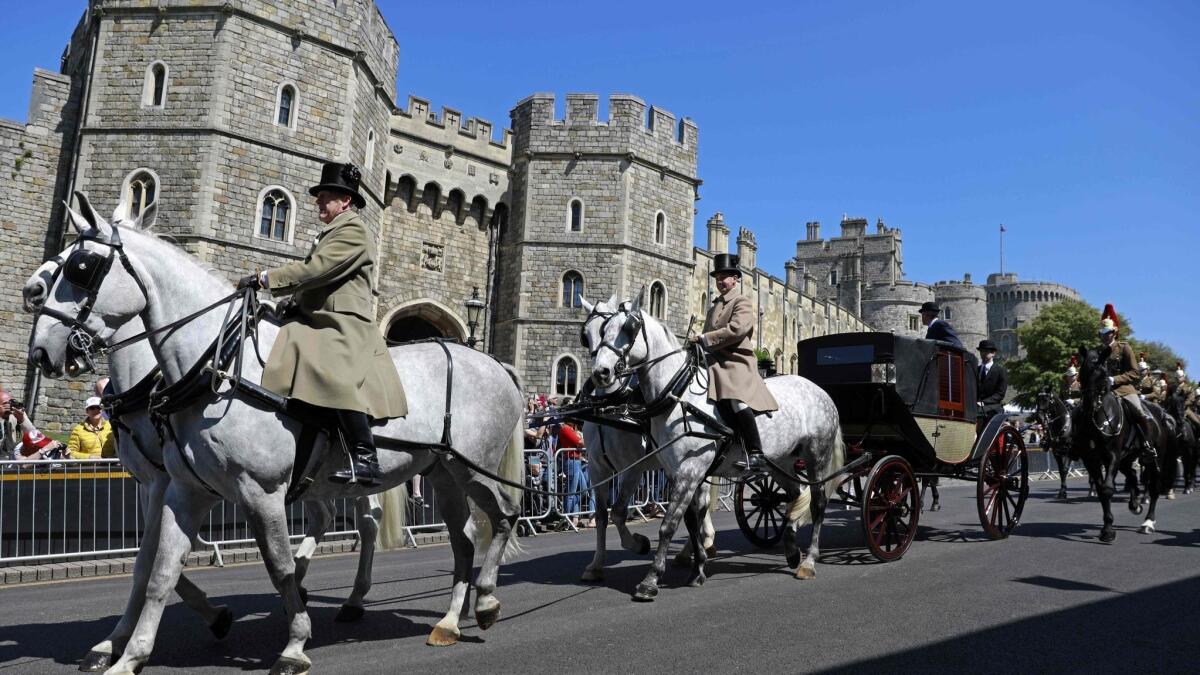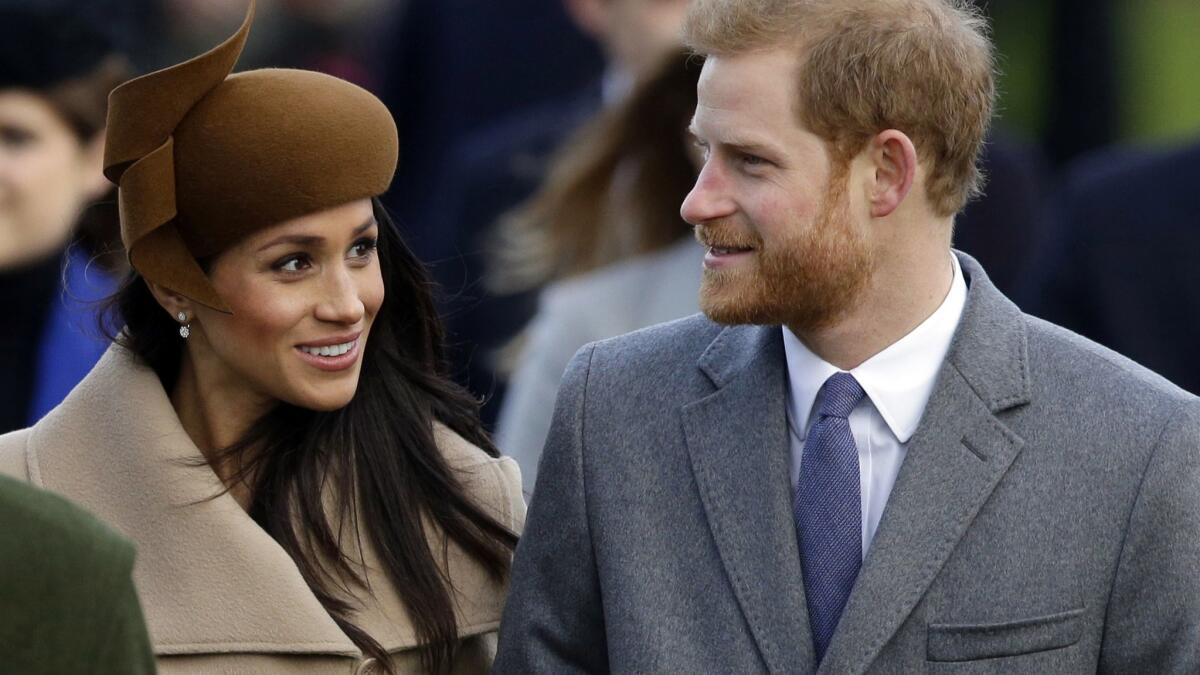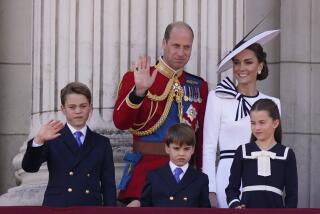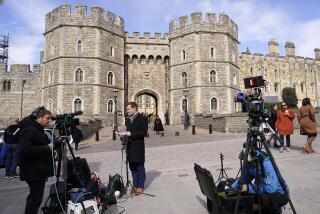After centuries of practice, Britain’s royals figure out how to turn a wedding into a global watch party

The House of Windsor may be slow, but it’s not dumb.
A dazzling royal wedding, watchable from just about anywhere in the connected world, serves up one more example of how the British royal family has survived and even eked out triumphs through war, tabloids, television and Twitter.
And that’s not cynicism speaking; it’s admiration.
This weekend, that ol’ Windsor magic casts its spell again. It transforms a pair of 30-somethings getting hitched into a global watch party. It transmutes simple “I dos” into gold — tens of millions for the British till.
And it’ll be sure to conjure up a bonus bump in popularity for an institution that has been pronounced dead more times than Bela Lugosi.
Over its 1,200-year lifespan, the English monarchy has been repeatedly rescued, and sometimes rescued itself, from monarchs who have been incompetent, overambitious, and arrogant. One French royal family, the Bourbons, was notoriously and fatally renowned for learning nothing and forgetting nothing — repeating mistakes and holding grudges. The British royal family has slowly figured out how to correct its own unforced errors.
When Meghan Markle walks in the west door of St. George’s Chapel at Windsor on Saturday, her size-7 bridal shoes will step over the grave of Exhibit A, the self-righteous King Charles I, who was executed in 1649 after losing his power struggle with Parliament. The outcome: a headless Charles, and a kingless commonwealth. When the monarchy was restored, Charles I’s philandering heir begot enough illegitimate, titled offspring to populate the House of Lords, but as king, Charles II never did get the upper hand on the House of Commons.
The “Virgin Queen,” Elizabeth I, was a canny, cautious player of the royal power game, and near the end of her life, she declared with fine theatricality: “ … though God hath raised me high, yet this I count the glory of my Crown, that I have reigned with your loves.“ The second Queen Elizabeth, five centuries later, came that close to losing “your loves” when she seriously misread the public’s angry mourning for Diana, the divorced princess of Wales, killed in a Paris car crash in 1997. It was as near as the British monarchy came to being shown the exits since the abdication of King Edward VIII in 1936.
That technology could put the public right there at the altar for royal weddings was a radical thing for a slow-moving thousand-year-old institution. Centuries of royal weddings have been private gatherings for family and courtiers.
Still, all the to-ing and fro-ing in splendid carriages was free for oohing and aahing to anyone who could crowd along the procession route. Queen Victoria’s choice of a white wedding dress was supposed to have been so the crowds could see her more clearly; 140 years later, Lady Diana Spencer was said to have picked ivory silk over white for her gown, because the color white flares badly on TV screens.
These weddings have run from low-key to downright hole-in-corner affairs. Henry VIII’s Wife No. 2, Anne Boleyn, was already pregnant at the altar, and he married Wife No. 3, Jane Seymour, just 11 days after he ordered Wife No. 2 beheaded. (Midway through his marital career, Henry sounded out Queen Christina of Denmark as bride material, to which overture she was quoted as saying, “If I had two heads, I would gladly give him one.”)
Henry’s grandfather, Edward IV, hustled his hot-looking commoner bride to the altar in secret — even her father was kept in the dark — and the whole thing may have been intended as a ruse to get her in the sack.
Now that a sovereign can no longer rally the realm by, say, invading France, a monarchy that reigns but no longer rules needs popular support. One stumble and one success at a time, the crown has figured out the art of crisis management, and weddings send the polls aloft like nothing else.
A hundred years ago, seeing so many foreign royal cousins lose their thrones and their lives in World War I scared the Windsors into letting some light and air into their palaces. Princes and princesses now wedded English aristocrats instead of titled foreigners.
Film cameras and microphones pushed open the cathedral doors. In 1923, theatregoers could watch newsreels of the marriage of the future King George VI to the future Queen Mother. But the Archbishop of Canterbury vetoed the brand-new BBC from broadcasting the audio to the kingdom, lest men in pubs listen to it with their drinks in their hands and their hats on their heads.
When the country needed bucking up after World War II, the future Queen Elizabeth II’s wedding, in 1947, was broadcast on the radio. Her sister’s was the first televised royal wedding, in 1960, and its profile, too, raised the royal reputation along with the national mood. In Princess Margaret’s soap-opera saga of a few years earlier, she renounced her divorced war-hero beau in the interests of religion and status. Her televised wedding to a charming, semi-bohemian photographer stamped a “happy at last” capper on the story of the princess’ rebound from her broken heart.
The queen’s daughter, Princess Anne, who would have been happy to be married on horseback in the countryside, submitted to the TV rigors of Westminster Abbey for her 1973 wedding in the cold, dark depths of a national recession. As for Charles and Diana in 1981 — loved the wedding, too bad about the marriage.

The British crown knows that the British people deserve a bit of bling for their money. Not coincidentally, a small-r republican movement flourished in Britain off and on during Victoria’s 40 years of grim-faced widowhood. In 1864, someone hung on the fence of the run-down Buckingham Palace a mock for-rent sign reading, “these commanding premises to be let or sold, in consequence of the late occupant’s declining business.”
In 150 years, the soundings of Britons’ feelings for the monarchy have fluctuated like a seismograph chart. But Americans, freed of royal rule for more than 200 years, have come to develop a besotted regard for the spectacle of royalty. Now that an American woman is marrying into “the firm,” England is being overrun by more Americans than it’s seen since World War II.
The most ingenious PR firm could not have dared to craft by design a marriage the royals have achieved by the happenstance of love: Harry, a combat-veteran prince whose beautiful mother died tragically, a royal highness who cavorted through his youth, in a Nazi uniform at a masquerade party, with no clothes at all in what the tabloids gloated to call a “nude Vegas romp,” and whose restless heart was captured at last by Meghan, a divorced, biracial American actress.
In a stroke, the marriage of a junior prince implausibly far from inheriting the throne takes on a staggering symbolic importance to Britain and its Commonwealth, not unlike that of the Obama family occupying the White House.
When Queen Victoria’s husband, Prince Albert, said the royal family “must have some strong, dark blood” to flourish, he meant that the family tree was overgrown with inbred, lymphatic blue-eyed blonds, and needed some healthy brunettes. But his phrase takes on a 21st century richness now; a royal family that includes Meghan Markle on the Buckingham Palace balcony begins to look more like modern, multiethnic Britain.
Saba Abay runs a nursery in London, and when Meghan and Harry came to visit Brixton four months ago, Abay told the Guardian newspaper, she sensed “a real buzz” in Britain’s biggest African Caribbean community. “They are changing the face of the royal family. I’m from a very mixed family — I’m Ethiopian and my husband is English and Sierra Leonean — and I think they feel genuine.”
Thus, although a revolution lost “the colonies” for Britain, this weekend, the colonies are giving to the British royals an American woman who may help to be the saving of them.
More to Read
Sign up for Essential California
The most important California stories and recommendations in your inbox every morning.
You may occasionally receive promotional content from the Los Angeles Times.











